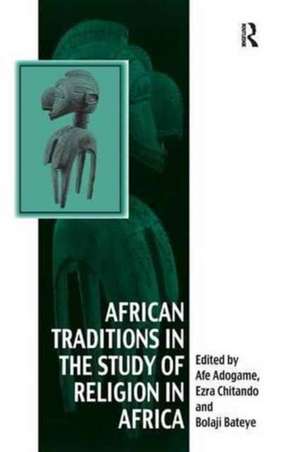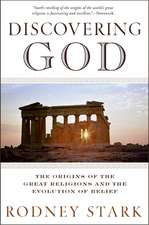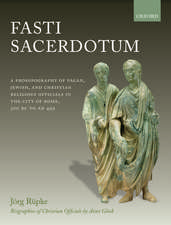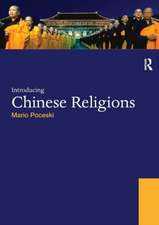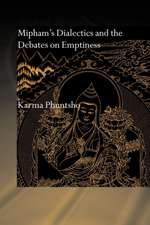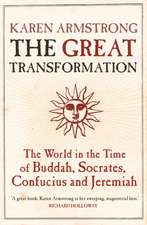African Traditions in the Study of Religion in Africa: Emerging Trends, Indigenous Spirituality and the Interface with other World Religions: Vitality of Indigenous Religions
Autor Ezra Chitando Editat de Afe Adogameen Limba Engleză Paperback – 15 noi 2016
| Toate formatele și edițiile | Preț | Express |
|---|---|---|
| Paperback (1) | 466.88 lei 6-8 săpt. | |
| Taylor & Francis – 15 noi 2016 | 466.88 lei 6-8 săpt. | |
| Hardback (1) | 1115.51 lei 6-8 săpt. | |
| Taylor & Francis – 2 mar 2012 | 1115.51 lei 6-8 săpt. |
Din seria Vitality of Indigenous Religions
-
 Preț: 567.84 lei
Preț: 567.84 lei -
 Preț: 469.34 lei
Preț: 469.34 lei -
 Preț: 389.66 lei
Preț: 389.66 lei -
 Preț: 383.33 lei
Preț: 383.33 lei -
 Preț: 435.21 lei
Preț: 435.21 lei -
 Preț: 489.10 lei
Preț: 489.10 lei -
 Preț: 386.18 lei
Preț: 386.18 lei -
 Preț: 383.30 lei
Preț: 383.30 lei -
 Preț: 489.26 lei
Preț: 489.26 lei - 16%
 Preț: 338.33 lei
Preț: 338.33 lei -
 Preț: 380.78 lei
Preț: 380.78 lei -
 Preț: 416.22 lei
Preț: 416.22 lei - 18%
 Preț: 1109.18 lei
Preț: 1109.18 lei - 17%
 Preț: 257.25 lei
Preț: 257.25 lei -
 Preț: 379.86 lei
Preț: 379.86 lei -
 Preț: 489.26 lei
Preț: 489.26 lei -
 Preț: 394.19 lei
Preț: 394.19 lei -
 Preț: 489.26 lei
Preț: 489.26 lei - 17%
 Preț: 259.92 lei
Preț: 259.92 lei - 18%
 Preț: 1000.27 lei
Preț: 1000.27 lei -
 Preț: 449.41 lei
Preț: 449.41 lei - 18%
 Preț: 1000.27 lei
Preț: 1000.27 lei -
 Preț: 449.41 lei
Preț: 449.41 lei -
 Preț: 323.23 lei
Preț: 323.23 lei - 18%
 Preț: 1054.71 lei
Preț: 1054.71 lei - 18%
 Preț: 1109.18 lei
Preț: 1109.18 lei -
 Preț: 469.34 lei
Preț: 469.34 lei
Preț: 466.88 lei
Nou
Puncte Express: 700
Preț estimativ în valută:
89.34€ • 93.09$ • 73.97£
89.34€ • 93.09$ • 73.97£
Carte tipărită la comandă
Livrare economică 03-17 aprilie
Preluare comenzi: 021 569.72.76
Specificații
ISBN-13: 9781138261099
ISBN-10: 1138261092
Pagini: 280
Dimensiuni: 156 x 234 mm
Greutate: 0.4 kg
Ediția:1
Editura: Taylor & Francis
Colecția Routledge
Seria Vitality of Indigenous Religions
Locul publicării:Oxford, United Kingdom
ISBN-10: 1138261092
Pagini: 280
Dimensiuni: 156 x 234 mm
Greutate: 0.4 kg
Ediția:1
Editura: Taylor & Francis
Colecția Routledge
Seria Vitality of Indigenous Religions
Locul publicării:Oxford, United Kingdom
Cuprins
Contents: Preface, Ulrich Berner; Introduction: African traditions in the study of religion in Africa, Ezra Chitando, Afe Adogame and Bolaji Bateye; Part I Emerging Trends in the Teaching of African Religions: African religions in African scholarship: a critique, Umar Habila Dadem Danfulani; Challenges and prospects of teaching African religion in tertiary institutions in East Africa, Adam K. arap Chepkwony; Teaching African traditional religion at the University of Zimbabwe, Tabona Shoko; Gender and the teaching of religious studies in Nigeria: a primary overview, Oyeronke Olademo; Mainstreaming HIV/AIDS in African religious and theological studies, Musa W. Dube. Part II Indigenous Thought and Spirituality: Women, narrative traditions and African religious thought, Anthonia C. Kalu; African spirituality from 'noise, dust, darkness and dancing', Lilian Dube; Tribes without rulers? Indigenous systems of governance and sustainable rural development, Rose Mary Amenga-Etego; 'Life is more superior to wealth'?: indigenous healers in a contemporary African community, Amasiri, Nigeria, Elijah Obinna; Christianity and the negotiation of cultures: a case study of Yakurr festivals in Nigeria, Dodeye U. Williams. Part III Christianity, Islam, Hinduism: 'From prophetism to pentecostalism': religious innovation in Africa and African religious scholarship, J. Kwabena Asamoah-Gyadu; Perceptions of women's health and rights in Christian new religious movements in Kenya, Philomena N. Mwaura and Damaris S. Parsitau; Religion and divine presence: appropriating Christianity from within African indigenous religions' perspective, Victor I. Ezigbo; African traditional religion in the study of the New Testament in Africa, Lovemore Togarasei; Southern African Islamic studies scholarship: a survey of the 'state of the art', Muhammed Haron; Folk beliefs about spiritual power and Hinduism in Ghana, Albert Kafui Wuaku; Index.
Notă biografică
Dr. Afe Adogame teaches Religious Studies and World Christianity at the University of Edinburgh, UK. He is the General Secretary of the African Association for the Study of Religion (AASR). He is the author of Celestial Church of Christ: The Politics of Cultural Identity in a West African Prophetic-Charismatic Movement (1999); and co-edited European Traditions in the Study of Religion in Africa (2004); Religion in the Context of African Migration (2005); Unpacking the New: Critical Perspectives on Cultural Syncretization in Africa and Beyond (2008) and Christianity in Africa and the African Diaspora: The Appropriation of a Scattered Heritage (2008). Dr. Ezra Chitando teaches History and Phenomenology of Religion at the University of Zimbabwe. He also serves as a Consultant on HIV and AIDS for the World Council of Churches (WCC). He is the author of Singing Culture: A Study of Gospel Music in Zimbabwe (2002); Living with Hope: African Churches and HIV/AIDS. Vol. 1 (2007); Acting in Hope: African Churches and HIV/AIDS, Vol. 2 (2007) and Troubled but not Destroyed: African Theology and HIV (2009). Dr. Bolaji Bateye teaches Religious Studies and Gender Studies at Obafemi Awolowo University and she is a Resource Person at the OAU Centre for Gender and Social Policy Studies. Dr Bateye was a Leventis Scholar at the Centre for African Studies, SOAS, London in 2006. A budding scholar, widely published in books and journals including: 'Forging Identities: Women as Participants and Leaders in the Church among the Yoruba", Studies in World Christianity (2007); 'Paradigmatic Shift: Reconstruction of Female Leadership Roles in New Generation Churches in South-western Nigeria" in Afe Adogame, et al. (eds.) The Appropriation of a Shattered Heritage: Christianity in Africa and the African Diaspora. (2008).
Recenzii
'As a multidisciplinary project it succeeds beautifully, with scholarly expertise ranging from sociology to history, theology to anthropology, and gender studies to political science. Yet even with this wide scope, the editors have managed to achieve synergy throughout.' Journal of Religion in Africa
Descriere
This book presents a unique exploration of African traditions in the study of religion in Africa and the new African diaspora. Contributors drawn from diverse African and global contexts situate current scholarly traditions of the study of African religions within the purview of academic encounter and exchanges with non-African scholars and non-African contexts. Jacob Kehinde Olupona stands out as a pioneer in the socio-scientific interpretation of African indigenous religion and religions in Africa. This book marks his immense contribution to an emerging field of study and research.
